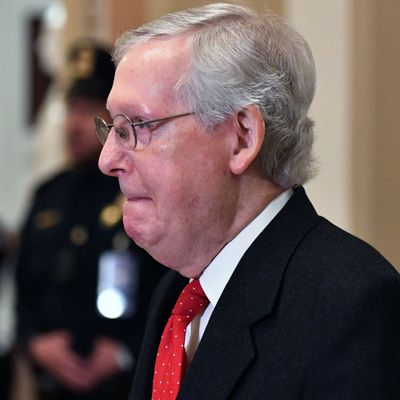
The first day of President Trump’s impeachment trial centered on the rules of evidence. Democrats want to admit documents and testimony the administration has blocked, and Republicans want to, well, block them. So far, Mitch McConnell is winning. He held his entire caucus together in a series of votes to block any new evidence from being admitted before the trial begins.
But the victory is Pyrrhic. Given that a vote to remove is almost inconceivable — Trump could shoot somebody on Fifth Avenue and all that — the trial is fundamentally an exercise in shaping public opinion about Donald Trump and his abuses of power. By voting to withhold evidence, Republicans are placing themselves in the unpopular position of abetting a cover-up.
From the outset, Trump announced that he was declaring his conduct in the Ukraine affair exempt from any congressional investigation or scrutiny. The president not only refused to personally testify (as Bill Clinton did with Kenneth Starr) but ordered his bureaucrats to likewise boycott all congressional proceedings, and blocked all documents. His clear plan was to drag the debate out in the courts so long it would either go beyond the election, or be resolved so late in the process that impeachment seemed to be superseding the election.
As it is, Republicans are already making the latter argument. Democrats are impeaching too fast (a “rushed” process that didn’t wait for the courts to exhaust every appeal of Trump’s obstruction) and too slow (a process impinging on an election year, thus “interfering” with the election.)
The House has attempted to navigate its way through the too-fast, too-slow dilemma. It concluded that enough evidence had made its way through Trump’s obstruction — bureaucrats willing to defy the president, public statements by Trump and his associates — to prove his guilt beyond a reasonable doubt.
Many Republicans have privately understood Trump quite obviously extorted Ukraine to investigate his rivals (Fox New analyst Brit Hume recently admitted this: “I don’t think very many Republican senators are going to say that they think Trump did that or that he’s guilty of that,” he mused, “but I think most of them think that he did.”) This argument would be a perfectly coherent basis for refusing to allow more evidence. They know Trump did it, and they just don’t care. But since Trump has refused to concede anything to his critics, and his allies have followed suit, they have contorted themselves into the posture of pretending to take the evidence seriously while assiduously working to suppress it.
The Democratic case is fairly clear: The evidence they managed to obtain proves Trump’s guilt, but if Republicans aren’t satisfied, they should examine the rest of the evidence. The Republican case for withholding it is absurd. McConnell has attacked the House case as a “shoddy work product” and “the most rushed, least thorough and most unfair impeachment inquiry in modern history,” while blocking all efforts to broaden it. If the House has indeed failed to do its job, shouldn’t the Senate correct the error? Instead, McConnell insists the House has done a rushed and shoddy job of collecting the evidence, and therefore the Senate must not collect any more. Claiming the House has failed to do its job, he now insists the Senate must likewise fail to do its job.
Whatever value this position has to the GOP, it is not a political asset. Polls show some three-quarters of the public want the Senate to admit new evidence. Trump’s own rhetoric hints at the vulnerability. Interviewed by reporters at Davos, Trump claimed he would like former national security adviser John Bolton to testify, but, “I’ll leave that to the Senate.” Feigning transparency while pretending the decision is out of his hands is a familiar Trump gambit. He repeatedly generated headlines quoting his alleged desire to testify to Robert Mueller under oath (“Trump says he is willing to testify under oath in U.S.-Russia probe”; “Trump says he still ‘would like to’ testify before Mueller”) with the fine print buried lower (“He later said that the decision to talk to Mueller would be ‘subject to my lawyers’ but that he personally would like to do it”). With Mueller, Trump was hiding from the truth and foisting it on his lawyers. Now he is foisting it on Senate Republicans.
McConnell has held his handful of wavering members together by delaying any decision on new evidence. It is obviously not a choice he relishes. The impeachment trial is an exercise in displaying the Republican Party’s institutional culpability in Trump’s contempt for the rule of law. At some point, they will have to decide to damn the president or to damn themselves.






























